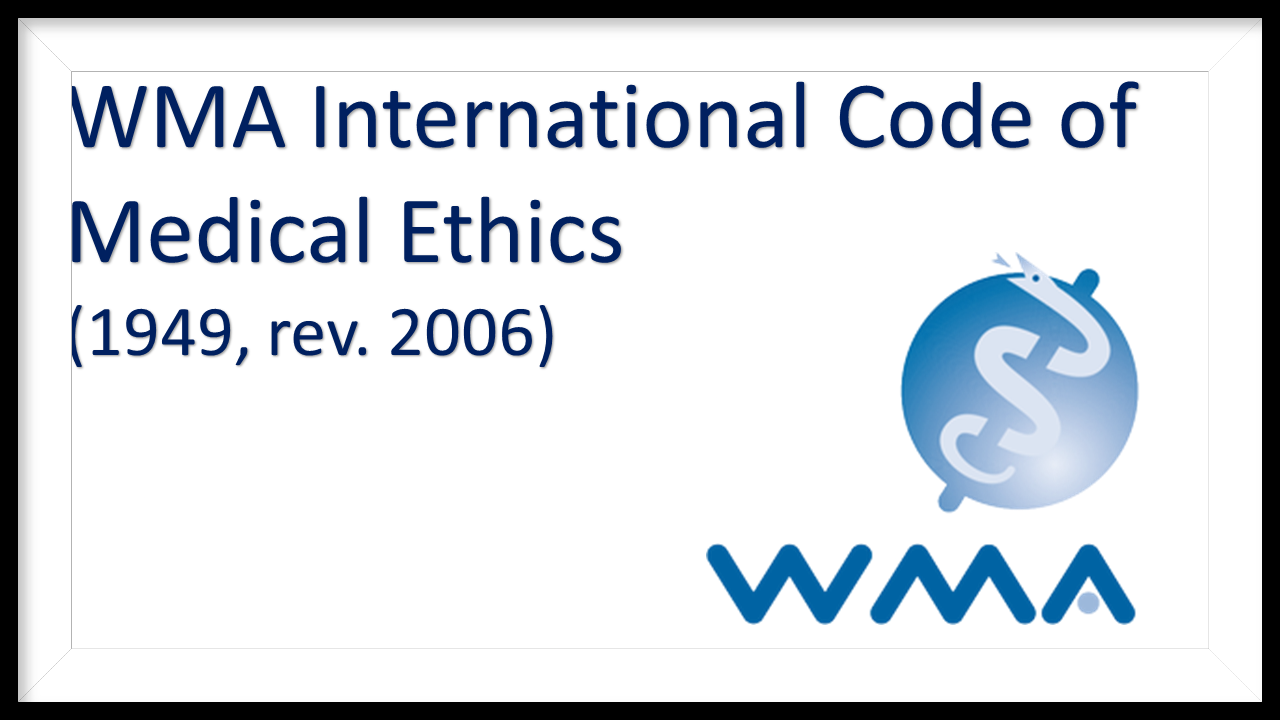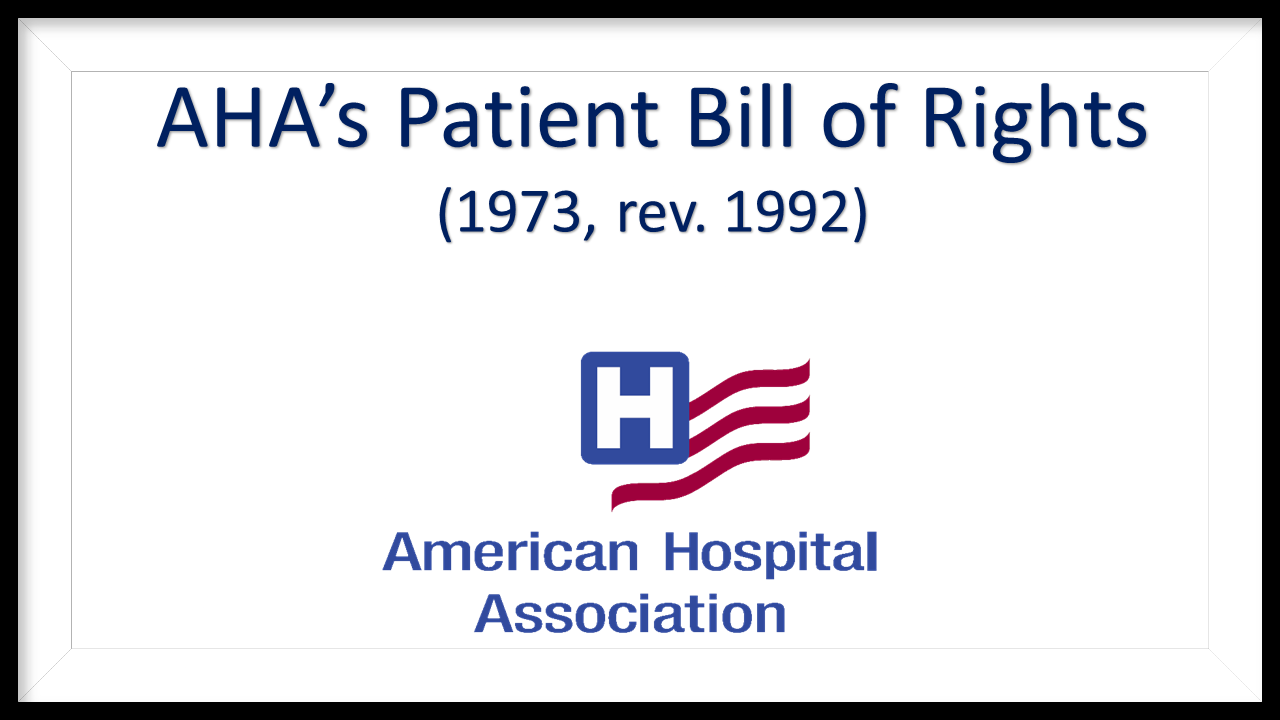
Follow VAERS Explorer on Social Media
American Hospital Association's Patient Bill of Rights
(1973, revised 1992)
The American Hospital Association (AHA) first adopted the Patient's Bill of Rights in 1973 to support patients' rights during care delivery. AHA encourages institutions to adapt and simplify this code to serve their specific patient populations best.
AHA Bill of Rights (1992)
The patient has the right to considerate and respectful care.
The patient has the right and is encouraged to obtain from physicians and other direct caregivers relevant, current, and understandable information about his or her diagnosis, treatment, and prognosis.
Except in emergencies when the patient lacks the ability to make decisions and the need for treatment is urgent, the patient is entitled to a chance to discuss and request information related to the specific procedures and/or treatments available, the risks involved, the possible length of recovery, and the medically reasonable alternatives to existing treatments along with their accompanying risks and benefits.
The patient has the right to know the identity of physicians, nurses, and others involved in his or her care, as well as when those involved are students, residents, or other trainees. The patient also has the right to know the immediate and long-term financial significance of treatment choices insofar as they are known.
The patient has the right to make decisions about the plan of care before and during the course of treatment and to refuse a recommended treatment or plan of care if it is permitted by law and hospital policy. The patient also has the right to be informed of the medical consequences of this action. In case of such refusal, the patient is still entitled to appropriate care and services that the hospital provides or to be transferred to another hospital. The hospital should notify patients of any policy at the other hospital that might affect patient choice.
The patient has the right to have an advance directive (such as a living will, health care proxy, or durable power of attorney for health care) concerning treatment or designating a surrogate decision-maker and to expect that the hospital will honor that directive as permitted by law and hospital policy.
Health care institutions must advise the patient of his or her rights under state law and hospital policy to make informed medical choices, must ask if the patient has an advance directive, and must include that information in patient records. The patient has the right to know about any hospital policy that may keep it from carrying out a legally valid advance directive.
The patient has the right to privacy. Case discussion, consultation, examination, and treatment should be conducted to protect each patient's privacy.
The patient has the right to expect that all communications and records pertaining to his/her care will be treated confidentially by the hospital, except in cases such as suspected abuse and public health hazards when reporting is permitted or required by law. The patient has the right to expect that the hospital will emphasize confidentiality of this information when it releases it to any other parties entitled to review information in these records.
The patient has the right to review his or her medical records and to have the information explained or interpreted as necessary, except when restricted by law.
The patient has the right to expect that, within its capacity and policies, a hospital will make reasonable response to the request of a patient for appropriate and medically indicated care and services. The hospital must provide evaluation, service, and/or referral as indicated by the urgency of the case. When medically appropriate and legally permissible, or when a patient has so requested, a patient may be transferred to another facility. The institution to which the patient is to be transferred must first have accepted the patient for transfer. The patient also must have the benefit of complete information and explanation concerning the need for, risks, benefits, and alternatives to such a transfer.
The patient has the right to ask and be told of the existence of any business relationship among the hospital, educational institutions, other health care providers, and/or payers that may influence the patient's treatment and care.
The patient has the right to consent to or decline to participate in proposed research studies or human experimentation or to have those studies fully explained before they consent. A patient who declines to participate in research or experimentation is still entitled to the most effective care that the hospital can otherwise provide.
The patient has the right to expect reasonable continuity of care and to be informed by physicians and other caregivers of available and realistic patient care options when hospital care is no longer appropriate.
The patient has the right to be informed of hospital policies and practices that relate to patient care treatment, and responsibilities. The patient has the right to be informed of available resources for resolving disputes, grievances, and conflicts, such as ethics committees, patient representatives, or other mechanisms available in the institution. The patient has the right to be informed of the hospital's charges for services and available payment methods.
The collaborative nature of health care requires that patient and/or their families and surrogates participate in their care. The effectiveness of care and patient satisfaction with the course of treatment depends, in part, on the patient's fulfilling certain responsibilities:
Patients are responsible for providing information about past illnesses, hospitalizations, medications, and other health-related matters.
Patients must take responsibility for requesting additional information or clarification about their health status or treatment when they do not fully understand the current information or instructions.
Patients are responsible for making sure that the health care institution has a copy of their written advance directive if they have one.
Patients are responsible for informing their physicians and other caregivers if they anticipate problems in following prescribed treatment.
Patients also should be aware that the hospital has to be reasonably efficient and equitable in providing care to other patients and the community. The hospital's rules and regulations are designed to help the hospital meet this obligation.
Patients and their families are responsible for being considerate of and making reasonable accommodations to the needs of the hospital, other patients, medical staff, and hospital employees.
Patients are responsible for providing necessary information for insurance claims and for working with the hospital as needed to make payment arrangements.
A patient's health depends on much more than health care services. Patients are responsible for recognizing the impact of their lifestyles on their personal health.
In 2003, the AHA replaced the Patients' Bill of Rights with a plain language brochure that informs patients about their rights and responsibilities during a hospital stay. The patients can expect high-quality hospital care, a clean and safe environment, involvement in their care, privacy protections, and help when leaving the hospital and with their billing claims.
References
American Hospital Association. Chicago, 1992. Chapter 6: Rights, Truth and Consent. Section 4. Readings. The Patient's Bill of Rights AHA. Catalog no. 157759; Queensborough Comunity College CUNY. Available at: https://www.qcc.cuny.edu/socialsciences/ppecorino/medical_ethics_text/ and
Chapter_6_Patient_Rights/Readings_The%20Patient_Bill_of_Rights.htm
American Hospital Association. The Patient Care Partnership, 2003. https://www.aha.org/other-resources/patient-care-partnership
Last updated: September 10, 2022
Milestones in Medical Ethics
Follow VAERS Explorer on Social Media



















